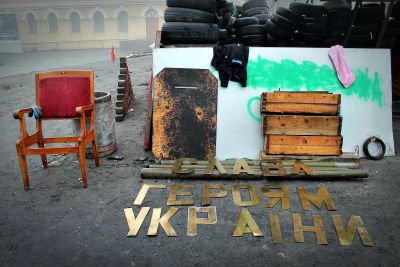Why Russia Should Remember 1914
We are approaching the centenary of the First World War. A hundred years ago this year, Europe was thrown into a bloody conflict that could have been avoided through a political solution. Imperial diplomacies had failed the peoples of Europe, who paid for it with the lives of a whole generation.
March 6, 2014 -
Ola Cichowlas
-
Articles and Commentary

Photo: Wojciech Koźmic
In Eastern Europe, this is a largely forgotten conflict. Revolutions, civil wars and independence days have overshadowed the Great War, not least because of the incomparable scale of suffering Eastern Europe endured during the Second World War.
But it is high time for Russia to take a closer look at this part of history (which, by the way, has not ended, as Francis Fukuyama suggested). Its aggressive moves in Ukraine are reminiscent of the 1914 scenario. No, Europe is not about to be thrown into the Third World War. We are not going to start re-digging the trenches that have grown over the dried blood of young men a century ago. Nineteenth-century imperialism is not experiencing a renaissance. But a minimum of historical memory should drive the Kremlin back to rationality.
In 1914, Austria-Hungary annexed Bosnia-Herzegovina following the assassination of Archduke Franz Ferdinand in Sarajevo. In 2014, the Russian Federation has de facto invaded the Crimean peninsula, which is part of the Ukrainian state, following the ousting of Kremlin-backed Ukrainian president Viktor Yanukovych.
In 1914, Vienna encouraged violence against Serbian residents, hoping for the local population to destroy each other; Austria then delivered a series of ultimatums made intentionally unacceptable to Serbia. In 2014, the Russian army has issued a number of ultimatums to the Ukrainian army; the Kremlin, too, is making intentionally unacceptable demands to a new Kyiv government, which it does not seem to fully recognise.
In 1914, the tense situation led to the July Crisis, a month-long diplomatic deadlock among the major powers of Europe that ultimately ended in open warfare. In 2014, we are in the middle of our own diplomatic crisis, as Europe is failing to produce an adequate response to Russian aggression. Before escalating its military solution in Ukraine, an over-confident Russia should revise the lessons of its forgotten war.
The First World War ended in the October Revolution in St Petersburg. In the Soviet era, Russians celebrated November 7th as the day of the Great October Socialist Revolution (confusingly, it happened in October by the old style calendar). Today, Russians have been given National Unity Day instead on November 4th. This is because there is no other word loathed more inside the Kremlin’s walls than “revolution”.
Moscow has made its views on the Ukrainian Revolution clear: it is an unacceptable fascist coup. Russia seems ready to go to war against the new Kyiv government, which it considers illegitimate. But the truth is that the Kremlin is on the defensive: it feels threatened by the Maidan. It is the whispering in Kremlin corridors that if it could happen in Kyiv, it could happen in Moscow that sends shivers down the spines of Putin’s henchmen.
The victory of Ukrainian street protests and the toppling of the Yanukovych regime inspired a generation of a Russian opposition that has been scarred by failure. If Moscow is not frightened enough by a Ukrainian uprising, it should be scared of its own 1917 scenario. To be clear, Russia will not repeat a socialist revolution and Putin will not share the same fate of Nicholas II. But he may not want to become another Yanukovych.
The end of the First World War also saw the slow death of European imperialism and the political birth of national self-determination. What is a sad Remembrance Day in London is a joyful Independence Day in Warsaw. The Kremlin should not reconsider reviving imperialistic traditions in modern Russia. Foreign occupations in Europe have always ended badly, as have the Kremlin’s numerous historical attempts in gathering all Slavs under its giant wing.
The last and perhaps most important lesson of 1914 is that it inevitably led to 1939. The rise of the Nazis and the way Europe dealt with them in 1938 serve as a painful lesson to all European governments. If Russia opts for war in Ukraine, it should be ready for further conflict.
Russia’s policy on history is, unlike in many other areas, pro-active. The Kremlin favours a national history that is both noble and uncomplicated. This is especially true for the pseudo-historical Putinist version of the Great Patriotic War that emphasises the unity between the people and the state, not the state’s violence against the people.
The First World War does not fit into this patriotic version of Russian history; it is not quite clear who are the heroes and who are the traitors. Before Russia’s adventures in Ukraine, the Kremlin-owned Channel One aired a cynical documentary strangely entitled The Biochemistry of Treason. The Russian state, it concluded – just like the Soviet Union and the Russian Empire before it – could be destroyed from within.
The Kremlin’s response to the unfortunate comparison of Putin’s Russia with Hitler’s Germany and Sochi 2014 to Berlin 1936 that spiralled out of control during the coverage of this year’s Winter Olympics. Russian liberals, the documentary argued, are the Andrei Vlasovs (the Soviet general that defected to the Nazi side) of modern Russia. Mention the name Vlasov to the average Russian and he will think one word: traitor.
Now in Putin’s fourth presidential term, the narrative of heroes and traitors is essential. Heroes will be rewarded. Traitors will not be forgiven. The Kremlin has gone to war with what it considers as reincarnated Ukrainian Andrei Vlasovs.
Ola Cichowlas is a British-Polish freelance journalist, living between London, Warsaw and Perm. She covers Russian regional politics and the arts in provincial Russia.

































